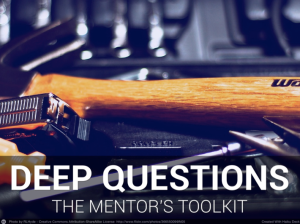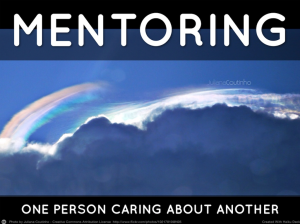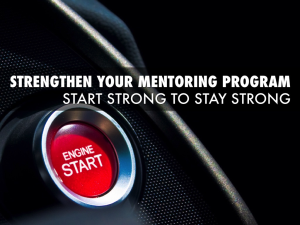by Center for Mentoring Excellence | Apr 28, 2015 | Growth and Development, Making Mentoring Work For You, Mentoring Relationships
Our recent annual Mentoring Matters Reader Survey revealed dozens of best practice topics. This blog is the first in our series of mentoring best practice posts soon to follow. Based on our survey results, here are the top ten:
- Start by getting to know your mentee
- Make sure you take time to get to know your mentee before you jump into the work of mentoring. Nothing of substance will happen until you establish a trusting relationship.
- Establish working agreements
- Agreements lay the foundation of a mentoring relationship. Build in basic structures about how you will work together moving forward. Make sure you and your mentee agree on ground rules.
- Focus on developing robust learning goals
- The purpose of mentoring is to learn. Learning is also the payoff. Make sure the mentee’s learning goals are worthy of your time and effort. Developing robust learning goals takes time and good conversation.
- Balance talking and listening
- It’s easy and natural to want to give advice, especially because you’ve “been there and done that.” But mentees want more than good advice. They want you to listen to their ideas as much as they want to hear what you have to say.
- Ask questions rather than give answers
- Take the time to draw out a mentee’s thinking and get them to reflect on their own experience. Ask probing questions that encourage them to come up with their own insights.
- Engage in meaningful and authentic conversation
- Strive to go deeper than surface conversation. Share your own successes and failures as well as what you are learning from your current mentoring relationship.
- Check out assumptions and hunches
- If you sense something is missing or not going well, you are probably right. Address issues as soon as possible. Simply stating, “I want to check out my assumption which is … ” will prevent you from assuming your mentee is on track.
- Support and challenge your mentee
- Work on creating a comfortable relationship first before you launch into the uncomfortable stretch needed for deep learning. Mentees need to feel supported (comfortable) and yet be challenged (a little uncomfortable) in order to grow and develop.
- Set the expectation of two-way feedback
- Candid feedback is a powerful trigger for growth and change. Set the expectation early on. Be prepared to offer candid feedback, balanced with compassion. Model how to ask for and receive good feedback by asking your mentee for specific feedback on your own mentoring contribution.
- Check in regularly to stay on track
- Keep connected and develop a pattern of regular engagement. Both partners need to be accountable for following through with agreements. By holding an open, honest conversation about how you’re doing and what you need to do to improve, you encourage mutual accountability and deepen the relationship.
What do you think? Did we miss any best practices? Let us know!
Keep a lookout for our next blog later this month, Top Ten Best Practices for Mentees.
by Center for Mentoring Excellence | Jan 23, 2015 | Facilitating Learning, Growth and Development, Making Mentoring Work For You, Mentoring Relationships
Starting Strong walks you through several fictional mentoring examples, highlighting the importance of the first 90 days of a mentoring relationship and pointing out invaluable conversations to have.
One of those fictional examples introduces readers to Rafa.
Rafa is a composite of hundreds of mentees we have worked with over the past 15 years. He’s an ambitious Millennial, and impatient to make it big and fast. To help him on his professional path, Rafa’s company has matched him with a savvy and experienced mentor. This is new for him, and he has no clue what to expect from a mentoring relationship.
Sound familiar? If you’re someone who is new to mentoring like Rafa, our new book, Starting Strong, can help you jumpstart your mentoring relationship and get it on solid footing right from day one.
Starting Strong models mentoring best practices by taking you inside a mentoring relationship, allowing you to observe, feel and experience six key mentoring conversations as they take place.
 As the story evolves over the first 90 days of their mentoring relationship, Rafa comes to appreciate the importance of a good launch, and the critical role preparation plays in moving forward. He learns many lessons about how to build a trusting, open and honest relationship, how to maximize his mentoring time, and how to take charge of his own learning.
As the story evolves over the first 90 days of their mentoring relationship, Rafa comes to appreciate the importance of a good launch, and the critical role preparation plays in moving forward. He learns many lessons about how to build a trusting, open and honest relationship, how to maximize his mentoring time, and how to take charge of his own learning.
The Conversation Playbook that follows the story is jam-packed with strategies, tips and probing questions that you can use to your advantage while working with your mentees.
Here are five ways to use Starting Strong to deepen your relationship, stay on track and raise the level of your mentoring practice:
- Invite your mentees to read Starting Strong and discuss Rafa’s experiences.
- During one of your initial sessions with your new mentee, address the questions at the end of each chapter.
- Prepare for your mentoring meetings by selecting questions from the playbook to deepen your mentoring conversations.
- When you bring your mentoring relationship to closure, give your mentee a copy of Starting Strong as a gift. It will help them prepare for the transition from mentee to mentor.
- And, don’t forget to benchmark your mentoring practices against those described in the book.
Purchase your copy of Starting Strong today!
by Center for Mentoring Excellence | Jan 20, 2015 | Mentoring Relationships, Mentoring Training
Are you an active mentor?
Do you believe you can get better at mentoring?
If you’ve answered yes, then you owe it to yourself to hone and deepen your mentoring skills. And, there is no better teacher than Cynthia Colson. But who is Cynthia Colson?
You’ll meet Cynthia and her mentee in our new book, Starting Strong. Cynthia is an experienced mentor who is committed to her own growth and development as a mentor and the growth and development her mentees.
 The story of Cynthia and her Gen-Y mentee unfolds over 90 days (six mentoring meetings) and you get to sit in on each of them. You will hear their private thoughts before, during and after their meetings. At the end of each chapter, you will find questions to prompt personal reflection and spark conversation about the chapter content.
The story of Cynthia and her Gen-Y mentee unfolds over 90 days (six mentoring meetings) and you get to sit in on each of them. You will hear their private thoughts before, during and after their meetings. At the end of each chapter, you will find questions to prompt personal reflection and spark conversation about the chapter content.
The conversation playbook guides you so that you can engage in parallel conversation with Cynthia and her mentee. It prepares you for your mentoring sessions by suggesting appropriate conversation topics, starters and probing questions to use to build a solid foundation for your own mentoring relationships during the first 90 days.
If you’re ready to move your mentoring practices from good to great, you won’t want to miss this opportunity to benchmark your mentoring skills against Cynthia Colson’s best practices.
Starting Strong is available now. You can also enter to win a free audio book copy of Starting Strong: simply retweet here!
by Center for Mentoring Excellence | Jan 12, 2015 | Making Mentoring Work For You, Mentoring Relationships
Starting Strong: A Mentoring Fable provides a view inside six successful mentoring conversations that take place over 90 days. The reader is privy to the thoughts and reflections of both the mentor and mentee, and gets to observe the personal dynamics of a successful mentoring relationship as it unfolds. It’s an excellent training resource because it models how good mentoring should look and feel.
Cynthia is one of the mentors you meet in the book. Cynthia learned the hard way about how to create a successful mentoring partnership. After a few failed mentoring relationships of her own, she grew from the experience. By the time she launched her next relationship, she was savvier and had a clearer understanding of what it takes to achieve tangible results.
 As a Program Coordinator, your mentoring pairs can benefit from Cynthia’s wisdom and experience. During the first 90 days of her relationship, she engaged her mentee in six essential conversations that led him to deepened insight and transformation.
As a Program Coordinator, your mentoring pairs can benefit from Cynthia’s wisdom and experience. During the first 90 days of her relationship, she engaged her mentee in six essential conversations that led him to deepened insight and transformation.
What made the difference for Cynthia? What did she do differently that made her more successful? In Starting Strong, you will learn about Cynthia’s strategies for mentoring success:
- Cynthia recognizes that her mentee will be uneasy as the more junior employee, mentored by a senior executive. She takes time to get to know him and put him at ease before launching into the work of mentoring.
- Some key structures and agreements help set the tone and expectations for progress and accountability. The mentee, who is new to mentoring, thought mentoring was an informal drop-in relationship.
- Learning is the purpose and product of mentoring — and its goals drive the learning. Mentors and mentees alike struggle with goal setting. It can be tempting for mentees to pick goals they can easy achieve or that aren’t relevant to their work success.
- Application of skills and learning are a critical part of mentee success.
- Stumbling blocks are inevitable in mentoring relationships. Mentors and mentees need a confidential, safe place to get coaching around issues that surface.
- The 90 day mark is an excellent time to schedule a check-in with mentoring partners.
How have you made the most of your first 90 days of mentoring?
Learn more about how to strengthen your mentoring relationships — order your copy of Starting Strong today.
And don’t forget — enter to win a free audio book copy of Starting Strong. Simply go to Twitter here, and retweet!

by Center for Mentoring Excellence | Jan 12, 2015 | Goal Setting Conversation, Supporting Mentors and Mentees
Starting Strong provides a view inside six successful mentoring conversations that take place over 90 days. The reader is privy to the thoughts and reflections of both the mentor and mentee, and gets to observe the personal dynamics of a successful mentoring relationship as it unfolds. It’s an excellent training resource because it models how good mentoring should look and feel.
Cynthia is one of the mentors you meet in the book. She is an experienced mentor who is committed to her own growth and development as a mentor and the growth and development her mentees.
The story of Cynthia and her Gen-Y mentee unfolds over 90 days (six mentoring meetings) and you get to sit in on each of them. You will hear their private thoughts before, during and after their meetings. At the end of each chapter, you will find questions to prompt personal reflection and spark conversation about the chapter content.
Cynthia learned the hard way about how to create a successful mentoring partnership. After a few failed mentoring relationships of her own, she grew from the experience. By the time she launched her next relationship, she was savvier and had a clearer understanding of what it takes to achieve tangible results.
What made the difference for Cynthia? What did she do differently that made her more successful?
In Starting Strong, you will learn about Cynthia’s strategies for mentoring success:
- Cynthia recognizes that her mentee will be uneasy as the more junior employee, mentored by a senior executive. She takes time to get to know him and put him at ease before launching into the work of mentoring.
- Some key structures and agreements help set the tone and expectations for progress and accountability. The mentee, who is new to mentoring, thought mentoring was an informal drop-in relationship.
- Learning is the purpose and product of mentoring — and its goals drive the learning. Mentors and mentees alike struggle with goal setting. It can be tempting for mentees to pick goals they can easy achieve or that aren’t relevant to their work success.
- Application of skills and learning are a critical part of mentee success.
- Stumbling blocks are inevitable in mentoring relationships. Mentors and mentees need a confidential, safe place to get coaching around issues that surface.
- The 90-day mark is an excellent time to schedule a check-in with mentoring partners.
The conversation playbook guides you so that you can engage in parallel conversation with Cynthia and her mentee. It prepares you for your mentoring sessions by suggesting appropriate conversation topics, starters and probing questions to use to build a solid foundation for your own mentoring relationships during the first 90 days.
Whether you read the book or listen to the audible.com version, there is plenty to talk about. Start the new year and get a book group conversation started.

 As the story evolves over the first 90 days of their mentoring relationship, Rafa comes to appreciate the importance of a good launch, and the critical role preparation plays in moving forward. He learns many lessons about how to build a trusting, open and honest relationship, how to maximize his mentoring time, and how to take charge of his own learning.
As the story evolves over the first 90 days of their mentoring relationship, Rafa comes to appreciate the importance of a good launch, and the critical role preparation plays in moving forward. He learns many lessons about how to build a trusting, open and honest relationship, how to maximize his mentoring time, and how to take charge of his own learning.
 As a Program Coordinator, your mentoring pairs can benefit from Cynthia’s wisdom and experience. During the first 90 days of her relationship, she engaged her mentee in six essential conversations that led him to deepened insight and transformation.
As a Program Coordinator, your mentoring pairs can benefit from Cynthia’s wisdom and experience. During the first 90 days of her relationship, she engaged her mentee in six essential conversations that led him to deepened insight and transformation.

